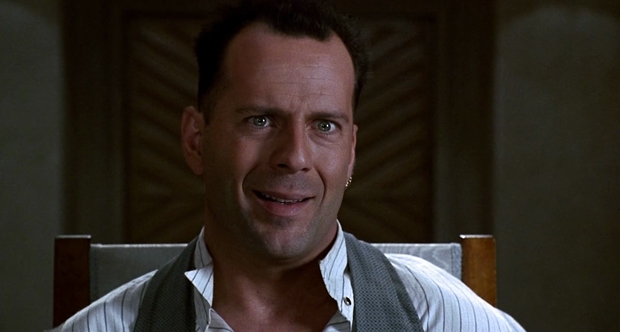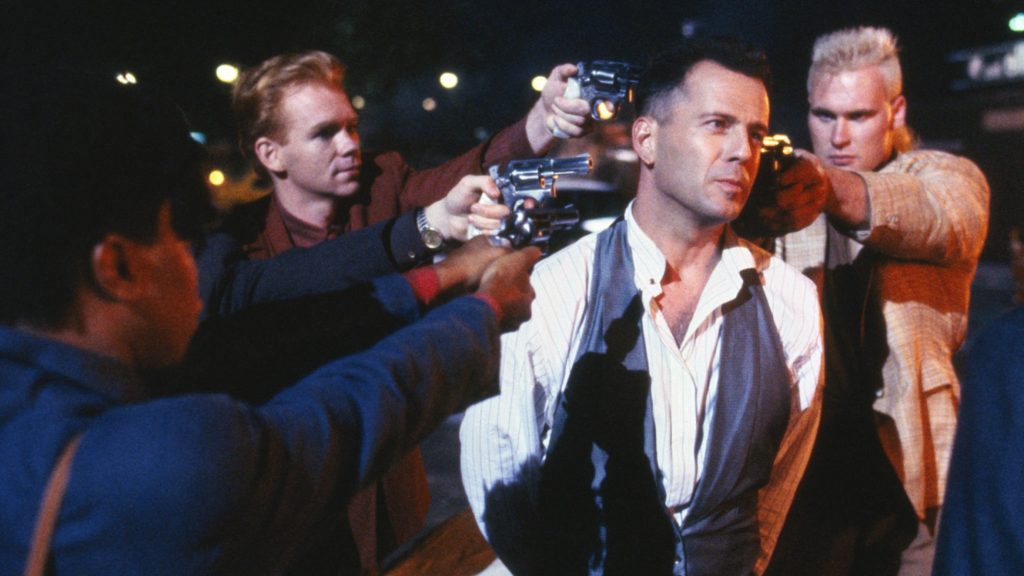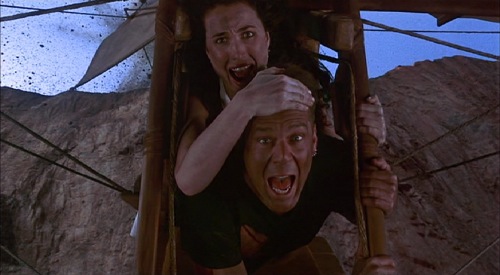The world is too messed up to obsess over bad movies as much as we do; isn’t it time we obsess over good ones? In his monthly column You Have To See This, Chuck Winters reaches into his pile of flawed, forgotten, or just plain fascinating gems to figure out what makes them tick and what makes them matter.

Bruce Willis kind of fell into action movies.
He was a blue collar kid from South Jersey who had a bad stutter until he found his swagger on the stage. After bouncing from honest job to job—security guard, transport driver, even a private eye—he decided to take a real shot at acting, eventually breaking through as David Addison in Moonlighting.
This is the Bruce Willis that viewers who tuned in each week saw:
Addison was said to be very close to the kind of guy Willis turned out to be once he got comfortable in his own skin: a motor-mouthed smartass always pulling pranks and getting thrown out of parties. John McTiernan only cast him in Die Hard after literally everyone else turned them down; Fox left his face out of the campaign and braced for impact. However, Willis’ background, combined with his strong everyman charm, ended up meshing with the film’s backdrop of rampant Reagan-era consumerism continually failing the common man. The rest is history: this wise-cracking South Jersey native was suddenly synonymous with Stallone and Schwarzenegger.
That action hero box, however, could be a bit of a bastard, especially in the 90s. At that point, cheap, low-effort action movies started to wear on the critical community; anyone considered to be an “action star” would start getting derided as The Worst Actor Ever for their mostly serviceable performances in movies that never required more. This derision wasn’t always undeserved; I dare anyone to defend Stallone’s work in The Specialist, wherein his lustful intrigue over Sharon Stone’s character at the beginning of the movie often plays like he’s a 14-year-old boy reading from a Zalman King script. Still, once you were in The Action Hero Box, the critical community simply didn’t have the capacity to give you an inch. It was in this environment that Bruce Willis had the nerve to try and make his mark—not with a sumptuous period drama designed to prove his chops, but with a zany action-comedy that took him back to his roots.
This column’s intended purpose is to turn you on to cool movies that you probably haven’t seen or never bothered with, but if you’re a regular reader of this site, there’s a better chance that you’ve seen Hudson Hawk than, say, Crazy/Beautiful. You may know that this movie, which was re-written by Daniel Waters from a Steven S. DeSouza script (which was in turn developed from a story by Willis and music executive Robert Kraft), and directed by Waters’ Heathers collaborator Michael Lehmann, is pants-on-head ridiculous. This is the movie that calls its mob boss characters The Mario Brothers. It names CIA agents after candy bars; James Coburn calls them “The MTV-IA,” much to their consternation. Rom-com sweetheart Andie MacDowell plays a secret agent nun. Hawk and his partner Tommy Five-Tone (Danny Aiello) time out their heists by singing Baby Boomer songs. ANDIE MACDOWELL PLAYS A FUCKING SECRET AGENT NUN. Hudson Hawk is a straight-up farce; it was never, ever meant to be taken seriously.
Try telling that to anyone who watched this:
Mmm-hmm. Well. I bet the critics were able to roll with the sucker punch of what this movie actually…
From Heaven’s Gate to Howard the Duck, the modern Hollywood fiascos — by now, a genre all their own — have been defined not just by their tedium but by their closet arrogance. Audiences can sense when the epic resources of the movie industry have been piled up before the camera in a colossally wasteful, big-budget heap. In Hudson Hawk, that arrogance is out of the closet. The qualities that describe most legendary turkeys — the mixture of spectacle and tin dialogue, the idiot plot that just keeps marching on, the actors who plug away with incongruous enthusiasm long after the film has died — are all here, yet in a peculiarly self-conscious, show-offy way. Hudson Hawk may be the first would-be blockbuster that’s a sprawling, dissociated mess on purpose. It’s a perverse landmark: the original postmodern Hollywood disaster.
–Owen Gleiberman, Entertainment Weekly, 5/31/91 (one of MANY)
I never vibed with Gleiberman’s writing; to me he reads like a guy who smothered his own ability to have fun with a pillow to better advance the narrative that Hollywood is creatively bankrupt. However, I can’t say he didn’t call this one. For starters, Hudson Hawk was a notorious bomb, grossing a little over $17 million against a $65 million budget—roughly $30.6M/$117M in today’s dollars. Imagine if Marvel made Guardians of the Galaxy and nobody showed up; that’s approaching the level of disaster we’re talking about here.
Gleiberman gets something else right, though, when he hits on the film’s self-awareness. The difference is that where he sees typical Hollywood arrogance flaunted in nigh-scandalous fashion, I see a reflection of Willis’s goofball personality and steadfast loyalty to the working class. It’s all in the story being told, the story that Willis himself shares credit for.
The main buy-in for the movie is that noted genius Leonardo da Vinci, in trying to come up with enough bronze to sculpt a large equestrian monument to Francesco Sforza, accidentally discovered alchemy. Understanding how dangerous this was, da Vinci broke apart the key component of his alchemy machine and hid the pieces in his most famous works of art. Worth noting about da Vinci: his father was a notary, his mother a peasant. Though his inclusion in the story can pretty easily be chalked up to “He’s Leonardo God Damn da Vinci,” it works in the film’s favor that his background was far from privileged.
See, hundreds of years later, cat burglar Eddie “The Hawk” Hawkins (Willis) is finishing up a ten-year stint in Ossining and is determined to go straight. Naturally, his crooked parole officer wants him to pull one last job, but we’ll worry about him in a minute. Despite his criminal proclivities, Hawk’s a lifelong Jersey guy who went to Catholic school, just like a lot of guys his age with working-class European immigrant roots would have. His aspirations are similarly meager; he just wants to hang out in his favorite bar and drink cappuccino—not just coffee, cappuccino, just a little taste of the high life is all he needs—until he dies of old age. That’s what his sights are set on when Tommy Five-Tone picks him up from Sing Sing, but right off the bat, even without his parole officer and the local mob stepping on his neck, there are complications. Gentrification has brought the hipsters in, Captain Bob’s Beloved Steering Wheel has been taken off display to make the new guys feel more at home, and to Hawk’s shock, “Reindeer Goat Cheese Pizza” is apparently a thing he can eat.
Worst of all, nobody will let him enjoy his damn cappuccino.

The viewer might not even realize it until the end: Throughout the movie, Hawk keeps trying to enjoy some fancy coffee, and the gears of the film’s absurd plot turn in ways that constantly push that precious cup further out of reach. It’s not until the end when Hawk is finally allowed to savor some refreshing Italian joe; that’s when the film’s narrator (William Conrad, who narrated the original Rocky and Bullwinkle series) breaks in to cement what this movie was really about. “With the world saved and the secrets of da Vinci protected,” he says, “Eddie finally got his coffee.”
Who are these bastards, then, that won’t let Hawk be Hawk? The film introduces the parole officer and the Mario Brothers as the initial antagonists, but that soon gives way to the people pulling their strings. Darwin Mayflower is a British tycoon who literally struts into his first scene to make a $100 million dollar bid at an auction, and then lets his wife—of course her name is Minerva—theatrically outbid him by a dollar. He has absolutely no compunctions with announcing himself as the bad guy of the picture; in fact, he relishes the fact that everything about him is evil. His wife is evil. His butler, who hides dual retractable swords under the sleeves of his proper uniform, is evil. His goddamn dog is evil. And his motivations aren’t complex at all: He’s bored with drowning in money, so now he and his wife want to dominate the world. The best way to do that? Have Hudson Hawk steal the three da Vinci pieces that hide the key to his alchemy machine and use it to flood the world economy with enough gold to crumble it and leave them on top of its ruins. Helping them out is George Kaplan (Coburn) and his team of candy bar CIA agents (one of whom is played by David Caruso in a silent performance that will range from “memorable” to “amazing” depending on your mood), looking to use the Mayflowers for their own ends. Kaplan is the guy who got Hawk sent to prison in the first place because of course he is.
This movie is about unchecked capitalist greed and the government’s willingness to kowtow to it strangling the common man’s ability to kick back and drink his luxury coffee, a message supported by the casting of Darwin Mayflower. This is far from the first time I’ve praised an actor for understanding exactly the kind of movie he or she is in, but I’m not sure I’ve ever seen anyone as utterly dialed in as Richard E. Grant is to Hudson Hawk. It certainly helps that Grant’s last big role before this was Bruce Robinson’s How to Get Ahead in Advertising, which opens up with a beast of a monologue that gets to the heart of everything that drives the culture of more, from the mouth of the guy (played by Grant) whose job it is to drive it. Here, Grant turns it up full blast, ignoring every instinct he has for nuance and control to go big, brassy, and utterly ridiculous, and he just seems to be loving every damn second of it. In fact, Grant goes so far over the top that casting noted loudmouth comedian Sandra Bernhard as Minerva isn’t just inspired, it’s utterly essential.
Look at this fucking clip.
Nominating Grant and Bernhard for Razzies on the merits of their work here is somehow both perfectly fair and absolutely shameful. I can’t help but wonder how that clip plays out of context, to someone who doesn’t quite understand that this movie casts The Vatican as a clandestine spy organization that keeps the world in check and “will not lie down for some schmuck from New Jersey.” That has a minor character, upon learning that there are 600-plus Wongs in the phone book, remark “That’s a hell of a lot of Wong numbers” without any shame. That has Andie MacDowell, who I remind you is A SECRET AGENT NUN, speaking dolphin after getting captured by Kaplan and The Mayflowers. A scene like The Mayflowers’ big supervillain moment would be a trash fire in a normal movie; in Hudson Hawk, it’s more like a lit iron stove on a crisp Christmas night.
All that said, I’d stop just short of calling Hudson Hawk “misunderstood.” Critics like Gleiberman seemed to get that Hudson Hawk was throwing a knuckleball—a lot of them just thought it went wild, and to that I’m sympathetic. If you had never seen Hudson Hawk, and you read all the gags I rattled off up above and thought “I can roll with that,” I still couldn’t guarantee that you’d like how it works in practice. Its goofiness operates at a specific frequency, and I sometimes wonder if it had to be so specific; if it would work for more people if it somehow leaned harder into absurdism, or perhaps sacrificed some of its smirking attitude to shore up some kind of emotional throughline. It’s arguable that Hudson Hawk, despite a scene where a stuffed elephant getting caught in a trap is briefly treated like a beloved supporting character’s death in a disaster movie, still takes itself too seriously for its characters to be as thin as they are, making it neither fish nor fowl.

Hudson Hawk is what it is, however, and I adore what it is. This I can say for sure: regardless of how the critics of the day felt, the film meant something a little more than just Willis and his friends getting paid to fuck around on set for a few months. This was a snapshot of the blue-collar goof Willis was, attempting to co-exist with the badass he suddenly became. In the fallout of Hudson Hawk‘s bombing, one look at Willis’ IMDB suggests something changed. Oh, he still did the occasional comedy, still found room for the occasional offbeat project. But after Hudson Hawk, he embraced The Action Hero Box, and save for a well-received, refreshingly warm performance in Moonrise Kingdom, he was never really rewarded whenever he stepped outside it. Lately, he hasn’t even been rewarded much for his tough guy performances; these days he’s lending his steely disposition to bargain bin crime thrillers like Catch .44, Fire With Fire, and Precious Cargo. It would seem audiences got bored with him; go figure.
A few years ago, he did Saturday Night Live. It was a solid but unremarkable episode, save for one pre-taped segment:
Trapped in the body of an aging action star, the heart of the South Jersey goofball still beats.
If you know of any movies that you think deserve to be covered in You Have To See This, feel free to tweet your suggestions to @DivisionPost!
